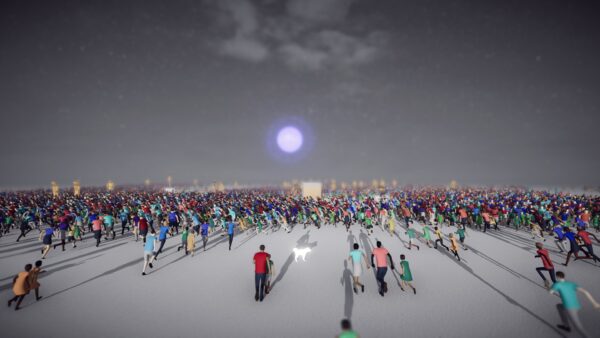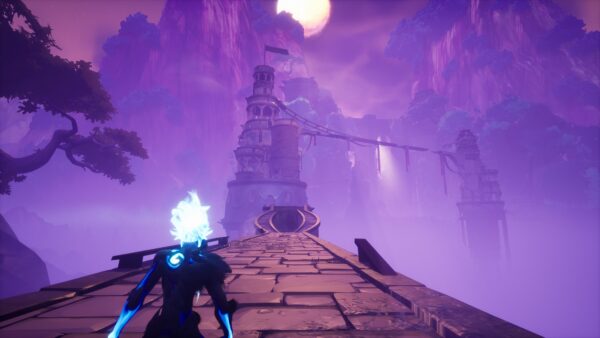
The sense of mystery The Forgotten City creates is immediate. A minute in, and we’re dropped into its ruins. There are upturned benches, discarded amphorae, and a degraded mosaic beneath a film of water, scattered with fallen masonry.
Most disturbingly, there are cowering figures frozen in gold. What calamity caused this?
A route through a subterranean chasm leads to an otherworldly portal. I walk forwards, and step 2000 years into the past. The Forgotten City is a mystery game set in an ancient Roman city. It is governed by a curse known as the Golden Rule. If one person sins, everybody is turned to gold. As a visitor from the future, our task is to reveal the source of the curse, or at least find a way out. Questioning locals and solving puzzles form the game’s essential dynamics, which are easily understood if you recognise that The Forgotten City is actually a re-creation of a critically acclaimed Skyrim mod.
While progression follows a familiar multiple-choice dialogue system, investigations must be balanced with the city’s moral code. When I impulsively steal a few denarii from someone’s bedroom, I’m startled to remember that there are consequences in this world. The walls tremble, a voice booms damnation, and the golden statues that ornament the city start peppering me with arrows.
Fortunately, the portal lets you relive the day from the beginning. Knowledge acquired in previous days can inform your next day’s tasks, which are painlessly logged for you. You can also keep the objects you pick up through successive time loops. So I retain the coins I steal, the poison remedy I lift from the price-gouging Decius, and I use the knowledge of a trap to counter a furtive assassin and acquire his bow. This cut-and-paste approach to puzzle-solving empowers your deductive reasoning, making the process of sewing together the various plots satisfying indeed. Yet until we happen on a solution to the Golden Rule, the day will repeat itself over and over again.

Our protagonist may not be Hercules, but he can time travel and shoot magic arrows.
It’s our prescient friend Galerius who likens our struggle to that of Sisyphus, condemned to the futile task of rolling a boulder up a hill. Galerius is the first inhabitant we meet. He’s a farmer and, true to Roman tradition, an honest and dependable ally to whom we can assign tasks we’ve completed previously. Other characters include former legionaries and quarrelling merchants. There’s the noble Sentia, who lounges in her father’s villa and laughs at our 21st-century clothes, and the tormented soul Livia. They may be victims of fate and functionaries of a wider narrative, but their conversations are rich with flavour. Though they number around a dozen, they fill the forum with life.
Key to unpicking the city’s mystery is learning how its residents arrived there. How did we arrive, for that matter? A hooded figure with a boat heaved on the shingle greeted us at the water’s edge. Interrogating the city’s inhabitants reveals similar tales: of being swept into Italy’s Tiber River, and once rescued, stumbling into a shrine with a trapdoor resembling a spinning coin. Terrified of the Golden Rule, our fellow amnesiacs took up residence in a city they cannot escape, resolved to appeasing the capricious gods.
This is a fragile consensus, and tensions over the Golden Rule come to a head at an election. Is it real? Or is it a fable Magistrate Sentius exploits to frighten people? Early on, it’s possible to ask for the election to take place immediately and observe the results. “No more shall you walk on eggshells!” declares the disbelieving victor. Of course, I already know what’s coming. I head straight for the portal.
Tampering behind the scenes of this election was critical to my solution in the game, but it might not be for yours. The time loop supports a multi-track narrative, with four different endings. Along the way, there are side quests to be completed and stories to be spilled. This gives an exciting sense of possibility that lingers after the game is finished. There are leads I haven’t chased, puzzles I haven’t cracked, and questions that remain unanswered.

You can spend your time checking off the number of mythological references.
Meanwhile the caverns of The Forgotten City are stratified with enthusiastic references to ancient history and mythology. It nods to topics like religious syncretism, the poetry of Ovid, and the Great Fire of Rome. Shelves are stuffed with bits of art and archaeology. We learn that women were named for their fathers, that collective punishment took place in the legions, and we meet characters in debt bondage and others made suspect for straying from cultural norms.
Helping us traverse the city are inexplicable zip wires and the use of a magic bow which turns ivy into bridges and ladders. I’m ambivalent about the violence. At some point, the narrative pulls the player through a palace where someone has peeled gold from the statues, creating aggressive skeleton creeps. It’s an unnecessary shift which displaces stimulating detective business with repetitive combat encounters.
Otherwise, exploring the depths of Modern Storyteller’s underground neighbourhood throws up delight and surprise. The Forgotten City is a smartly plotted experience with an ambitious time loop. If it overreaches, it’s in its conclusion which hubristically attempts to explain its own mysteries. Then again, you might love it. This is a unique and carefully crafted mystery game, brightened by smart writing and classical references that will charm many.
Highlight
Humour successfully infiltrates the writing. The merchant Decius warns of scoundrels operating nearby, and comically shifts his eyes side to side. The baker Fabia runs in flight from an intruder, directly into a shrine to which the note is attached: “WARNING: shrine may collapse at any moment”.
Verdict: 85%
An original sleuthing experience, enlivened by enthusiasm for the ancient world.
Genre: Mystery adventure
Format: PC (tested) / PS5 / XB S/X / PS4 / XBO / Switch
Developer: Modern Storyteller
Publisher: Dear Villagers
Price: £19.49
Release: Out now
Social: @ModnStoryteller





